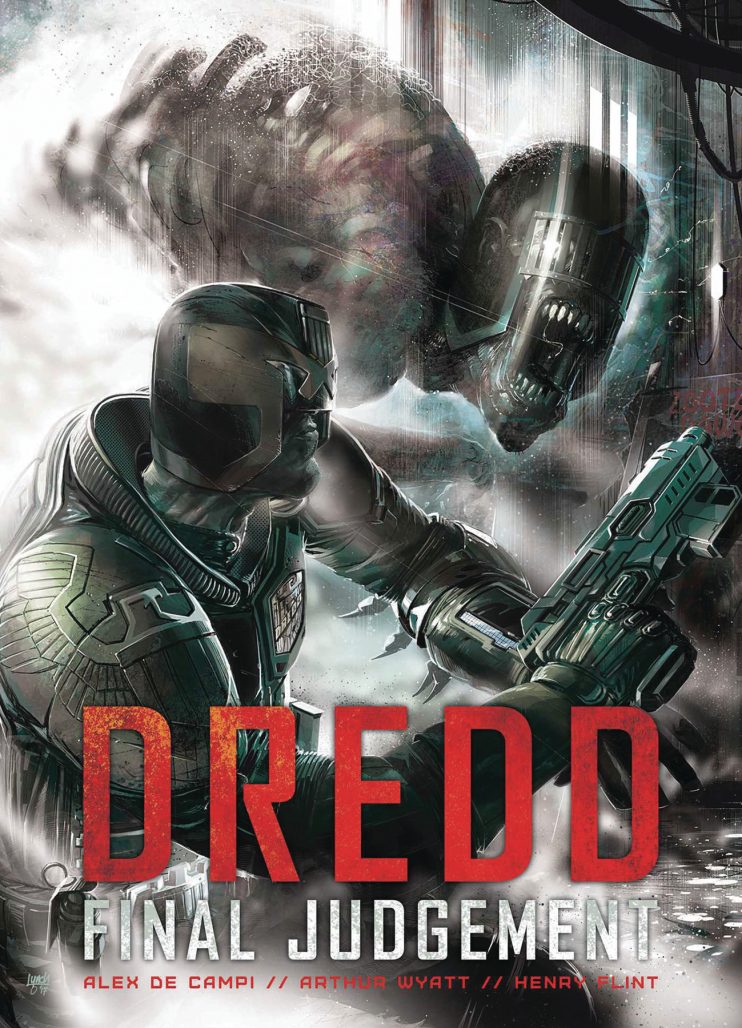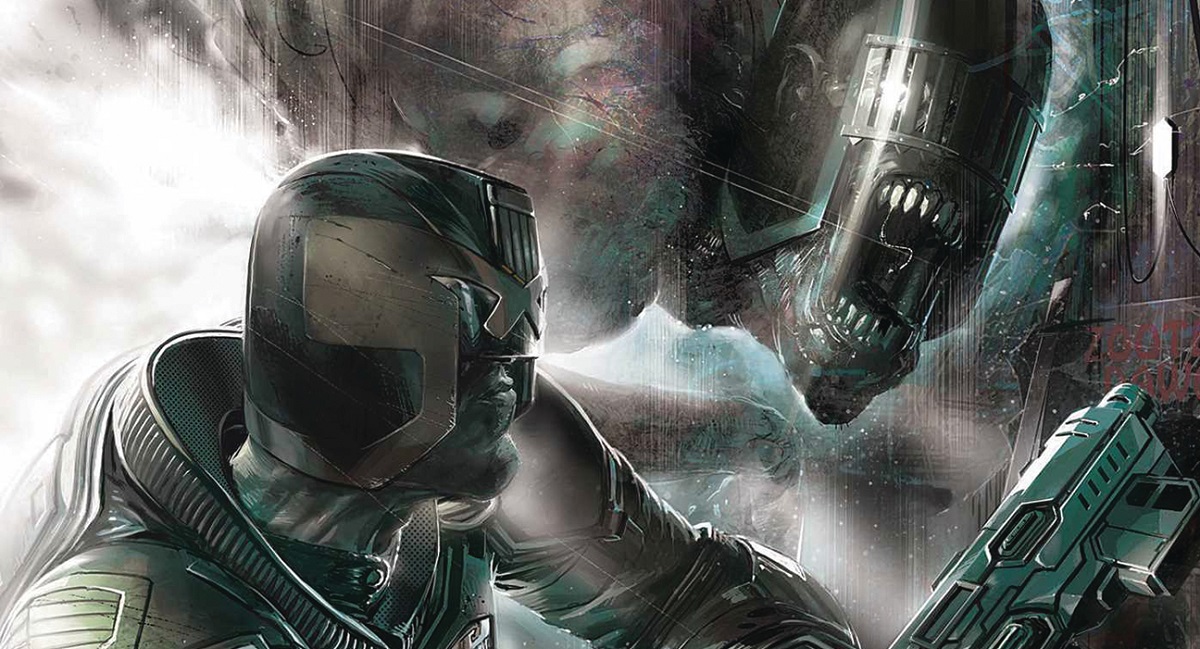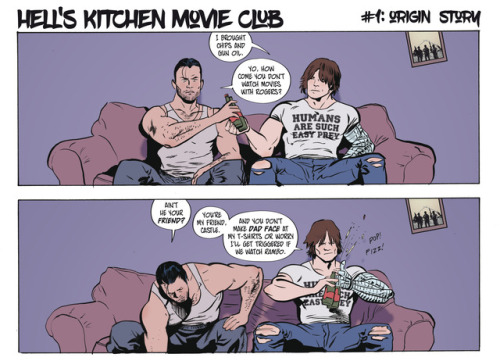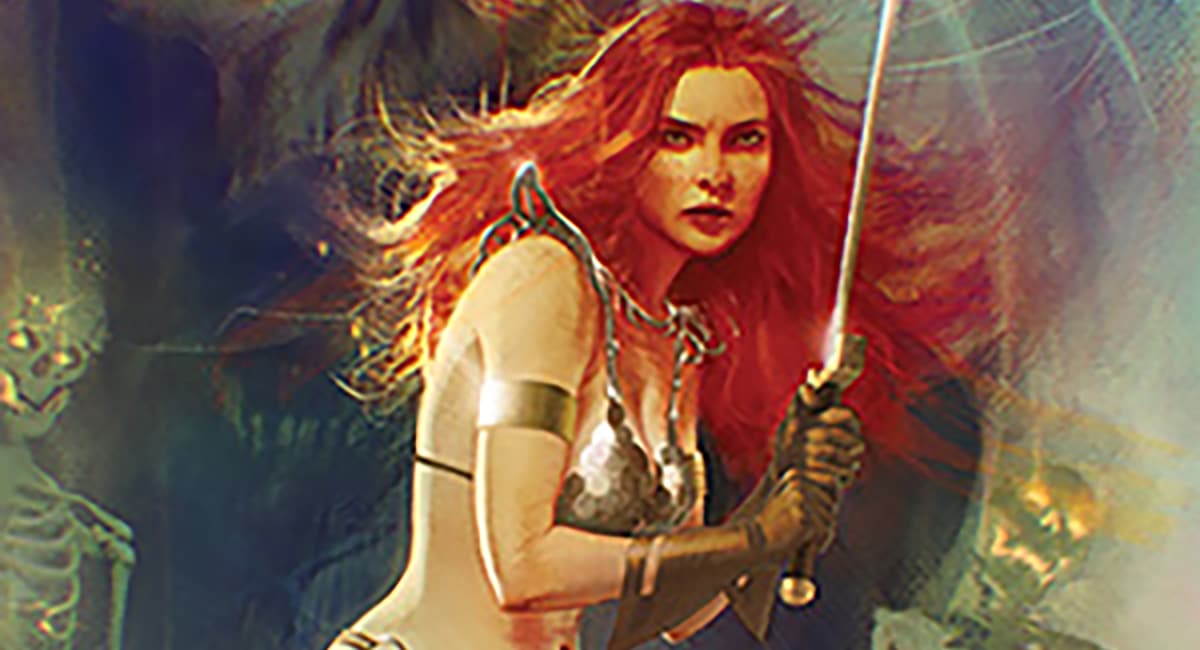by Kelly Kanayama

The Beat recently sat down with de Campi for an in-depth chat on writing comics in the Dredd movie universe, military deep cuts, what we don’t talk about when we talk about war, and more.
Kelly Kanayama: [Writer] Arthur Wyatt’s kind of filled me on Judge Dredd: Final Judgement, but is there anything you want to add from your perspective about its portrayal of Judge Death?
Alex de Campi: On the one hand, they gave a woman the Dark Judges and I did the first thing that everybody fears: I turned Judge Death into an undead Japanese schoolgirl. So I put him in a skirt, quite literally, as my first act. And weirdly, no one complained. We weren’t doing it just to be jerks; it was actually part of a very unsettling story about, essentially, a sense of despair throughout Mega-City One and people committing suicide. So because it was very natural within the plot that we created, which was a very sort of David Cronenberg/John Carpenter-style story, it worked. But also, I did put Judge Death in a skirt.
Art’s [Arthur Wyatt] talked about the main Judge Dredd comics he’s been doing and how they’re a little bit more on the wacky side of Dredd – and Dredd’s great, because you can do anything with Dredd. You can have stories that are ridiculous and humorous and bonkers, and then you can have really serious stories. I tend to do the more J. G. Ballard/John Carpenter end of the spectrum, so that the normal Dredd universe stuff I’m doing that’s coming up in the Megazine, including Christmas Dredd, is much more in that kind of unsettling, dystopian vein that we brought to Final Judgement. And even in Furies, my first movieverse Dredd with Art, we had an action scene that was judged too violent for Judge Dredd. I feel like I achieved some kind of squad goals by doing that.
Kanayama: What was the scene?
de Campi: I can’t even remember what it was, but it was something gross. But, you know, violence in and of itself isn’t that shocking. You can always have someone getting hit by a truck and body parts flying all over, and that’s fine. It’s when you care about the characters and something really visceral and horrible happens very, very quickly.
I’m fundamentally a character writer. I’m weird about genre – I keep forgetting to put the supernatural elements in, because I can make it horrifying with just two people sitting across a table, talking. When I do ultraviolence, it’s supposed to be unsettling, because violence shouldn’t be beautiful and romantic. It should make you never want to get into a fight again. And so that’s what I’m trying to do every time I do an action scene. It’s not trying to be cute or special; it’s trying to make you just want this to stop.
Kanayama: It sounds like what calls to you most in Dredd is the despair.
de Campi: It’s really great to be writing – I’m writing a whole bunch of dystopian science fiction right now. I’m doing Taarana for Heavy Metal, I’ve got the Dredd stuff. And in this current environment, where everything kind of sucks in the world, to be able to just write ten-page dystopian sci-fi stories is extremely good for my mental health. It’s been fun.
Kanayama: Speaking of violence and despair, your Hell’s Kitchen Movie Club comics, where Frank Castle and Bucky Barnes just watch movies and talk, have blown up on the comics internet…
de Campi: And there is no actual violence. It’s just those two assholes sitting around watching action movies, because no one wants to watch Rambo with Frank and Bucky. They think they’ll either a) be triggered, which they won’t, or b) will just start being gross, which they will.
Kanayama: Frank has always struck me as the kind of guy who would point out the inaccuracies in Rambo, like, “That’s not the kind of gun you would use to do that!”
de Campi: In some ways, that’s why I think they watch those movies. They find it really restful, because they’re just like, “Well, that’s not how it would happen in real life.” In the upcoming one, which I actually have drawn, but I’ve got a letterer, and which will be released in a couple of weeks, they’re watching Bad Boys 2 and talking about the highway fight scene. Bucky’s like, “I did better with a lobotomy,” and Frank’s like, “It’s not a contest.”
Kanayama: What made you decide to focus on Frank and Bucky specifically?
de Campi: It’s just that they’re the two veteran characters. I think they would just get along. They’ve been through a lot of the same kinds of shit, although in different time periods. And I just like putting them together and being able to reference certain veterans’ issues very subtly. In the Silent Running strip, which was about the Las Vegas shooting – possibly our most famous strip, read by about half a million people – Bucky comes in and hands Frank a bottle of whiskey, and goes, “Can’t drink. New meds. I brought Coke for myself,” that kind of thing. Everybody I wanted to know knew I was talking about PTSD meds without me having to mention it. You don’t have to over-script these things. It’s okay if 80% of your audience doesn’t get it, because the 20% that you want to get it will get it. And people are writing back, saying, “Thank you for writing about these characters taking PTSD meds – that’s my life, and I felt really validated to see it as something presented as normal in comics.”
Kanayama: Do you have to do a lot of research for the military aspects of the comic?
de Campi: I have a lot of links to the military – my ex-husband was in the British army, and in fact right now we are sitting in front of my booth, which has an Angolan tablecloth with a landmine awareness flag. And I’ve known a lot of British mercenaries and private military contractors; I’ve been to dinner at Rupert Spicer’s house, who used to run Sandline. We used to have defused landmines lying around as ashtrays. I know all about the guys talking about bringing things back from Afghanistan and Iraq on commercial flights; we had a Dragunov night sight lying around. Those fuckers weigh about 20 pounds. Russian military hardware is significantly over-engineered and not really built for high speed, but you could also club someone to death with it quite easily and probably not even damage the lens.
Kanayama: How do you know which movies Frank and Bucky will like?
de Campi: It’s entirely based on my own feelings about trashy action movies, and sometimes it’s a little bit random. The likelihood of Bucky having watched Silent Running is probably quite small, but, you know, I just pick movies that I enjoy. Like Hell Comes to Frogtown. Again, not a well-known movie, but it’s great. Any movie starring a wrestler is probably worth watching, unless the wrestler is Hulk Hogan, because fuck that guy.
Kanayama: As a dedicated Punisher tweeter, I have to ask: what is it about the Punisher that draws you to the character?
de Campi: Again, I’ve known a lot of veterans, and I’ve been married to a man in the service. I think what attracted me to Frank is that I found him really hard to write. You can always tell whether a Punisher writer likes the character or not, and I sometimes feel that they don’t actually like the character they’re writing. And Frank is not easy. Frank is, in many ways, a reprehensible human being. But working out his thought process – I don’t think we should always write things that are easy. As someone who is fundamentally a character writer, I love figuring out the psyches of people who would not necessarily be my friends or hold the same viewpoints as me, and trying to relate to them and understand them.
When I started Hell’s Kitchen Movie Club, it was basically a gag. And then the more I wrote Frank, the more I really enjoyed writing him and delving into his psyche, into how he keeps going and why he keeps going. We put a lot of that into Silent Running, the Vegas shooting one, about why Frank continues to do what Frank does. Then I ended up being friends with Gerry Conway, who co-created Frank, and one of the sweetest moments in my comics career was when Gerry told me, “You write an excellent Frank.” He’s now a big supporter of Hell’s Kitchen Movie Club, and he’s been an online friend ever since.
There’s a lot of places you can go with Frank and a lot you can write about that people haven’t necessarily bothered to do, because they’re just like, “Oh, he’s this vigilante character, this crazy guy,” and whatever. He’s not just Travis Bickle. I think Frank would be the first person to admit that he’s irrevocably broken. And I think that’s why he and Bucky are such natural friends in the context of Hell’s Kitchen Movie Club; they’re two guys who both know how fucked-up they are, and they keep going. It’s really important for so many of us, who are trauma survivors of all sorts of different traumas, to write trauma survivors as not being magically well again. They’re never necessarily going to be well again. But we’re all just keeping on keeping on, trying to take it one day at a time, and working through our PTSDs, our disabilities, and our trauma-related issues.
I have a lot of feelings about the portrayals of invisible disabilities and mental health in comics, superhero comics especially, and how they’re not done very well. Frank, as someone who has survived a great deal of trauma, and Bucky as well, are people who you can do really amazing storylines with – almost more Bucky than Frank, because there’s less done with Bucky. Ed Brubaker wrote the amazing Winter Soldier miniseries, and I think there is a great Marvel Knights or Marvel MAX 12-issue maxi series to be done about Bucky that has not been done – and may never be done, but there are so many places you can go with that character and make him so sympathetic as someone who is carrying, both physically and emotionally, all of these scars, but is still carrying on. It’ll probably never happen, but it would be great if it did someday.
Kanayama: What’s next for the comic?
de Campi: Hell’s Kitchen Movie Club actually turned into a screenplay, because I’d go out with my friends who are all comics writers and we’d drunk-workshop it. They’d ask me what I would do if Marvel ever gave it to me officially, and I made up this story, and they would workshop it with me. And then I was up for a TV writing gig, and my agent said, “You need to write up a TV spec really fast,” so I wrote it as a spec. But it’s so far removed from those characters now that it’s about two veterans, but there’s no way you could shove it down and make it Frank and Bucky again. For me, it’s much more interesting if the Frank character has an ex-wife rather than a dead wife.
Kanayama: He’s definitely just divorced, and the dead wife thing is him lying to himself.
de Campi: Yeah, the ex-wife is a major character. I think one of the things I loved about the Netflix show was that it was pretty clear that Frank’s wife ran his life. So I wanted this ex-wife character, where they don’t get along because they push each other’s buttons way too easily in a way that – sometimes when you go to your parents’ house, suddenly you’re 13 years old again and you’re behaving like an absolute brat, and you’re watching yourself do this like, “Nooooo!”, but you’re still doing it. So they still don’t get along, but because they’ve known each other for so long that they’re still kind of there for each other in this weirdly bitter, antagonistic way. And then Ryan Howe, who drew the Predator strip in Hell’s Kitchen Movie Club, is drawing it as an independent graphic novel. So it’s becoming a thing in all these different ways.
Also, the characters in the spec screenplay are all from South Boston; I have family from there, so writing Boston characters is really easy. A friend of mine read it and said, “There’s a lot of swearing in this.” And I’m like, do you even Boston?!
But the funniest thing is that my agent read the spec screenplay and said, “We should send this to Chris Evans,” without knowing the basis of it. Chris Evans is reading this fucking thing that was based on a Marvel thing, because they won’t hire women – I’ll probably never be able to write the Punisher or the Winter Soldier, and it’s a shame, but you know, you get over it. And now it’s going to be something that will make an infinitely larger amount of money. So who knows what’s going to happen?
We did a lot of research for this as well. I had two disabled veteran friends reading it to look over the portrayals of disabilities for the two main characters, Ethan and Sully. Sully has a traumatic brain injury, which is quite common among veterans – undiagnosed traumatic brain injuries are actually responsible for a lot of PTSD – and Ethan got hit pretty bad by an IED, so he’s missing the lower half of his left leg, and his right leg has mobility issues because it has shrapnel in it. So I sent this to veteran friends of mine and paid them consulting fees, because I’m using their lived experience as something that I’m going to make money off of, to read it and comment both on the military stuff and the army jargon, and also on living with disability.
Another major character is a CIA operations officer in Russia House, the agency’s Russian office, and my friend was a former Russia House analyst, so she read it for CIA veracity. We all know where we can handwave stuff, but there are some really, really specific Fort Bragg jokes in the screenplay that I’m exceptionally proud of.
So I just had a blast making this. It’s called Bad Karma, and you’ll maybe start seeing bits of it next year.









Wasn’t aware of de Campi’s most recent output and am glad to have that remedied here. Cool
Comments are closed.